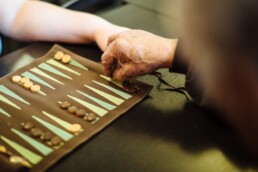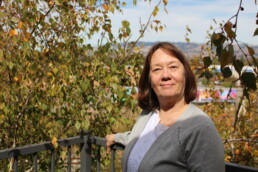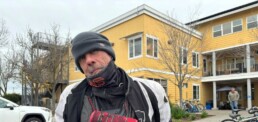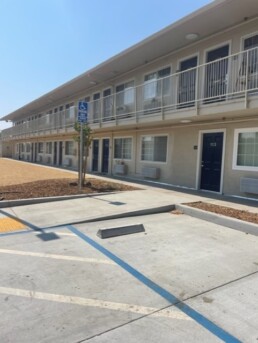Grace's Story
Grace came to COTS after spending almost a year in hospitals and rehab centers recovering from a stroke and a heart attack. While she was in care, still learning how to speak, walk, comb her hair, and handle a pencil, her roommate died in their shared apartment.
Without being aware of what was going on in the outside world, Grace lost her lease and all her belongings, even her identification and Social Security cards.
One bright spot in the time she spent in the hospital under strict COVID protocols was her son, Alex, outside her window on her birthday, holding up a poster board that let her know he loved her. “That’s my kid,” she says. “He’s the best. I swore I was going to be able to get out of there and hug my kids.”
Finally, she was partially recovered. But she was also homeless for the first time. “You’re vulnerable when you’re recovering from a stroke,” Grace says. “I came to COTS with a lot of fear.”
But she rarely showed it.
She dived into life at COTS, working with Jeremy, her physical therapist, outside on a wheelchair ramp, and volunteering in the kitchen as soon as she was able.
“[Chef]Janin was one of the first people I talked to at COTS,” Grace says. “I told her I wanted to do something, and she said she’d find me a job I could do. And she really did.”
Grace became a fixture at our front door, handing out meals and laughs to every community member who needed one, the other—or both. It was a great fit for Grace, who’d spent many years managing restaurants and inns in and around Guerneville. If you’re from those parts, you might remember her happy face at the wheel of Santa’s mail truck, heading to the Sisters of Perpetual Indulgence’s annual holiday dos.
“I do click with people,” Grace says, “and I also know how to find my people. I taught my kids to steer clear of drama, and that’s what I did at COTS.”
Grace found a supportive group of friends who encouraged and motivated each other. She also worked every day to recover from her stroke and to take care of any and all the red tape entanglements that could hold her back. She used COTS’ help to obtain her identification, increase her Social Security income, and finally file for a divorce from an ex whom she hadn’t seen in decades.
Luckily, she was eligible for a new affordable housing complex in Healdsburg, a town she might have driven through a few times but to which she had no ties. “I said, ‘Sure,’” Grace says. “Of course! I’ll make friends!” The application process was grueling and there were many construction delays, but Grace stuck with it—even after suffering another stroke—this time, mild.
Now, she’s getting to know her new town, enjoying the free concerts in the Plaza and the view of redwood trees out her bedroom window. Best of all? Inviting her two children to her apartment for home-cooked meals.
Thank you, donors, for giving us the support that brought Grace into our lives and into a home of her own. She gave us an example of grace, determination, and community that inspires our work. We are grateful to know her and grateful for your support.
Jane's Story
Jane* was a lively spirit on a path full of success until her world was turned upside down. Like so many others, the start of the COVID-19 Pandemic marked the start of a tumultuous next few years. Jane owned her own business, a successful massage therapy studio that was established in Petaluma almost two decades ago. However, the pandemic brought a drastic decrease in clientele and, after sustaining an injury to her wrist, she had to close her doors permanently.
As Jane approached her mid 70’s in age, she was without a sustainable income, as social security did not cover the cost of living. Luckily, Jane had savings she could tap into and for the next five years, she continued living in her home and prepared herself for what was to come next.
Jane knew she would eventually be forced to leave her home due to finances once her savings were depleted and moved her belongings into storage as she tried to wrangle applications for affordable housing options herself. With no background on the process, Jane was greeted with legal jargon and an insurmountable amount of paperwork. This was not going to be a quick process.
With an overwhelming feeling of panic and terror, Jane started to starve herself and her body weight fell to 75 pounds. Jane was slipping into a state of needing more care than her general doctor could provide her with but could not find the energy to care for herself any longer.
She was still racing against the clock of her savings running out and Jane tried to pursue all available options but could not cross the finish line to secure herself stable, affordable housing. She was forced out of her home and onto the streets of the Petaluma community she had long been an integral piece of.
With no other solutions, Jane called a shelter she knew was in Petaluma, COTS. Soon after speaking to a “kind” individual on the phone about the waiting list for a bottom bunk placement in the shelter at the Mary Isaak Center, Jane saw a light at the end of the tunnel. Partnering with Eileen from the Red Tape Club, she filed her application to stay at COTS and was placed in COTS’ People’s Village. “So, I feel this place [COTS] is a blessing to me. I've said that twice to you and I do I feel was a blessing.” Jane remained in People’s Village for 13 months, taking advantage of every single resource available to her.
One resource was access to meals from Mary’s Table at COTS. When she was living in her home, she loved eating the premade salads from Trader Joe’s and was ecstatic when she found that COTS provided deliciously similar salads.
Jane’s other key resource was again Eileen, in the Red Tape Club. Eileen helped her complete the paperwork she struggled to file on her own. Together they applied for PEP Housing, affordable housing for seniors. “Gratitude is one word I would say for this place. Really. Gratitude is what I feel more than anything. Not to mention that the people who, are they are so there's so able to do their job.” Jane was appreciative of the access to resources and often tried to encourage other clients to use them too – even if they were just staying at COTS for the emergency shelter. “Mary Isaak is good. Whenever they're able, they shut off half the kitchen and make the other part of the kitchen a place for people to be accommodated with mattresses for sleep- especially in the bad weather.”
Then, her application results came in. After months of filing paperwork and meeting with her Eileen, Jane had been accepted into permanent, affordable housing. Joy poured out of her as she prepared to move out. “I grew in love here. I grew in respect of others and to other people. . . To see that they are people, many of them have just marvelous, beautiful qualities that are different than me.”
She made beautiful cards for everyone who had helped her at COTS, and hand delivered them to their office spaces before her moving day.
“I know where I'm going is a lovely place, and I feel honored to have been so fortunate as to get a residence like this.”
At 82 years of age, Jane was as excited as a kid in a candy shop looking forward to her new place. Jane is also planning on finding a way to contribute back to other people in need. She would like to volunteer with
“Lutetia, and I love what she brings to people. And she knows that she tries to learn everybody's name. Of course, she's not going to know everybody's name. And but I have to become a friend of hers. Well, we are friends. And I would like to find a way one day a week to work with her and to do part of the work that she's doing on one of the days that she might be find me useful.”
*Client's name has been changed for privacy.
COTS' Diana Morales speaking at Petaluma's Women's Club
In November 2023, Petaluma’s Women’s Club welcomed COTS’ engagement specialist, Diana Morales, to speak about COTS to their members. As someone with lived experience, Diana passionately advocates for COTS whenever she gets a chance.
Diana lived on the streets of Santa Rosa for four years battling alcoholism until someone urged her to visit COTS. With no shoes on her feet, Diana boarded the bus and began the life-changing journey that has led her to permanent housing, full-time employment, and a rekindling of her relationship with her mom.
She highlighted that our clients' journeys start the moment they walk through our doors. Once they come in, they begin to realize they are in a safe place. They have access to hot showers, a safe bed, and steady food access. After they settle in, the work of securing their housing begins for both their care manager and them. Our transition to becoming a housing-focused program means that we require the clients to participate in their care and housing process.
Depending on each client's capacity and their long-term goals, COTS offers a variety of pathways to gain housing.
“Our shelters are not permanent housing, but they are a stepping stone to coming in off the streets.”
COTS has 80 beds and during this event, 65 were occupied by community members needing assistance.
COTS also provides Recuperative Care Housing. This style of housing allows neighbors experiencing homelessness to receive care from a medical facility and then have a safe, clean, and nourishing place to complete their healing process.
Also, COTS can allow clients to stay in our tiny homes, People’s Village. The 25 individual homes each have a desk, dresser, locking door, and communal access to showers and bathrooms.
Another route to housing is to rent at Studios at the Montero (SAM). SAM was created in partnership with Burbank Housing. An old hotel was renovated into 60 individual studio-style living units. Each unit’s rent is paid by the client as stated in their lease. Residents have access to care management, personal kitchenettes, bathrooms, a community gardening space, and a private parking lot.
With the need for affordable housing rising, COTS also utilizes integrity housing. COTS master leases housing in Petaluma, Cotati, Rohnert Park, and Santa Rosa. Then each of the rooms is rented out to those in our programs who are ready and able to live on their own. Each home has around four to five bedrooms. Like SAM, residents pay rent and have an official lease, but Integrity Housing is congregate living.
The rapid rehousing (RRH) team provides clients with access to state funding for deposits, the first month’s rent, and other fees. While the funding is not given to the clients, it is paid directly to the property managers or owners on the client's behalf. The rapid rehousing team steps in to help once clients have found a place to live and their rental applications have been accepted. Clients do not have to pay this funding back and receive inspections to ensure it is a safe and healthy environment for clients or families.
Once the housing is secured, the RRH team will help furnish the place and teach the clients how to save money and budget.
In addition to housing options, COTS provides many other client services.
Some members of Petaluma’s Women’s Club regularly volunteer, such as Lori who provides a sense of belonging to clients as they try to greet many of them by name while they are serving meals. These meals at the Mary Isaak Center, come from our certified chef who cooks and serves two homemade and delicious meals a day.
Our social services programs provide mental healthcare, physical and medical well-being, parenting classes, and more! COTS also partners with Petaluma Health Center to host Nurse Annie and her nurses in training for general care. Annie and her team can give our clients referrals to specialists, treat common ailments, and administer vaccinations.
The Red Tape Club at COTS assists with whatever may be restricting the clients back from achieving their goals. Red Tape Club has assisted clients with utilizing computers, filing applications, hosting mock interviews, finding employment, and handling legal issues.
With homelessness continuing to affect our community, COTS is a housing-focused program with wraparound services to help the whole person needing assistance in achieving their goals.
More Seniors are Experiencing Homelessness
How COTS serves this growing, vulnerable population.
At a time when they should be settling comfortably into retirement to enjoy the leisurely activities of their golden years, seniors are instead falling into homelessness for the first time—a disturbingly growing trend seen nationwide.
This increase in older adult homelessness is evident in the Recuperative Care (RC) program at COTS Mary Isaak Center.
According to HMIS data, in 2022, just more than half (52%) of RC clients were over age 55. In 2023, this number grew to 67%.
Recuperative Care also recently served its oldest client ever: 82 years old.
“We’re seeing this new group of older adults in the homeless population,” says Julia Gaines, COTS Sr. Recuperative Care Manager. “They are entering homeless after spending decades in a blue-collar career, maybe once owning a home. This group doesn’t have mental health or substance abuse issues or a criminal record. These seniors simply got sick, became disabled, or couldn’t afford their home, and without anyone to support them, they became homeless.”
This is exactly what happened to COTS shelter client Linda Guajardo, 73. “My husband died, and then I had a stroke,” she says of how she came to COTS in 2023. “I didn’t want to come to a shelter, but I had no choice,” she says sitting in her new apartment. “Turns out it was the best thing I could have done.”
Because they are experiencing homelessness for the first time, seniors often don’t know about services available in their communities and are sometimes hesitant to ask for help.
“Connection to resources is a key part of the services we provide,” says RC staff.
With accessibility, mobility, and cognitive issues, seniors have higher rates of food insecurity and transportation barriers, and are particularly vulnerable to victimization, especially if on the streets.
“When you’re older, you can’t carry all your stuff everywhere,” says Linda, recalling her time spent living on the streets. “So, people end up stealing it from you. They’ll take whatever they can grab.”
Serving older adults in shelters comes with unique needs and challenges. They are more likely to be suffering from common age-related ailments and mobility issues—vision and hearing loss, and dementia—all of which can cause imbalance and a high risk for falls. Some seniors may actually require 24/7 care at a skilled nursing facility (SNF), but it’s a challenge for hospital discharge planners to find SNF beds for patients on Medi-Cal in Sonoma County.
Julia says the key to serving older adults is homelessness prevention. “The best line of defense is their primary care doctor, who can assess them for housing and financial instability and connect them to services like COTS before they lose their home,” she says. “Meanwhile, we will ensure that the seniors that walk through our doors have access to health care, pathways to housing, and are treated with respect and dignity.”
The COTS Collective: February 2024

February COTS’ Collective.
Expanding Recuperative Care – Expanding Healthcare Access for Sonoma County:
For the past two years, COTS has worked tirelessly to identify and secure funding to expand our Recuperative Care program in Petaluma. This expansion, which increases our capacity to serve from 6 to 20 beds, makes a significant stride in addressing the pressing needs of unsheltered individuals within our community. This expansion isn’t just about adding more capacity; it’s about extending a lifeline to those who find themselves on the margins, offering not just shelter, but a pathway to recovery and stability.
Recuperative Care is a medical program that offers a safe, clean environment to hospital patients who are ready to exit from the hospital, but who do not have a home in which to heal. These additional beds serve as a bridge between hospital stays and returning to the streets, ensuring that individuals have the support they require to heal properly, and an opportunity to access various housing opportunities after their stay in the COTS Recuperative Care program.
Homelessness can be an incredibly isolating experience, exacerbating feelings of alienation and hopelessness. However, within the walls of Recuperative Care, individuals find a supportive environment where they are treated with dignity and respect. By expanding the facility, we’re creating space for more individuals to experience this sense of community, forging connections that can be instrumental in their journey towards stability and permanent housing.
This expansion also reduces strain on emergency services and hospitals—saving our community hundreds of thousands of dollars in emergency care each year. Without access to adequate shelter and healthcare, many unsheltered individuals resort to using emergency rooms as their primary source of medical care. Not only is this costly for hospitals, but it also diverts resources away from those who require urgent attention. By expanding Recuperative Care, we’re helping to alleviate this strain, ensuring that individuals receive the appropriate level of care in a more cost-effective and sustainable manner.
COTS is proud of this expansion and is proud to offer accessible options to everyone in our community. Expanding Recuperative Care from 6 beds to 20 beds is a testament to our commitment to serving the most vulnerable members of our community. It’s a tangible step towards creating a more inclusive and compassionate society, where everyone can rebuild their lives and realize their full potential. COTS envisions a community where everyone has a place to call home.
We invite you to support us by donating to our critical work, or through one or more of our volunteer opportunities. Learn more about supporting COTS by visiting www.cots.org.
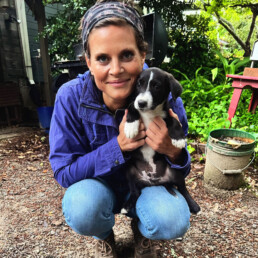
Until Next Time,

Chris Cabral, CEO
This month, COTS’ Legacy Society joined us at the Mary Isaak Center to get an insider’s look at our Recuperative Care expansion. Thank you to those of you who were able to attend!
If you would like more information on supporting COTS through a legacy, contact your financial planner or our Director of Development at development@cots.org or (707) 765-6530 x126.
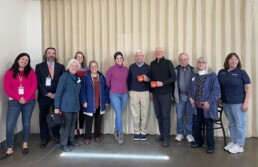
Above: COTS would like to thank the Legacy Society members for attending and ensuring that we will be there to help our neighbors in need for generations to come.
In 2014, COTS identified a new need facing the community. After being discharged, our neighbors experiencing homelessness needed a safe space to continue their healing journeys for injuries, illnesses, surgeries, etc. With continuous care, these individuals could heal well and reduce the number of returns to the hospital or calls for emergency services.
COTS created a 4-bed respite unit that supported the community until 2017, when the unit had to close indefinitely. In 2020, the respite unit was reopened under the name of the Recuperative Care Unit (RC) and now had 6 beds. This unit continues to serve clients today with medical transportation, appointments, care, and other medical related needs.
Last year, Recuperative Care’s 6 bed unit served 50 individual clients, with 80% of them not returning to the hospital and 92% of them transitioning to the Mary Isaak Center, assisted living, or housing.
With a large growth in seniors experiencing homelessness and those experiencing homelessness for the first time in their lives, COTS will expand the Recuperative Care unit from 6 beds to 20 this year!
Legacy Luncheon Brings Recuperative Care Updates
In February, our Legacy Society gathered at the Mary Isaak Center for a delicious meal and a captivating chat with Pat Higgins, COTS’ Lead Recuperative Care Specialist. COTS would like to thank everyone for attending and demonstrating an enduring investment in COTS’ mission, ensuring that we will be there to help our neighbors in need for generations to come.
In 2014, COTS identified a new need facing the community. After being discharged, our neighbors experiencing homelessness needed a safe space to continue their healing journeys for injuries, illnesses, surgeries, etc. With continuous care, these individuals could heal well and reduce the number of returns to the hospital or calls for emergency services.
COTS sought to fill the gap and transformed the former library at the Mary Isaak Center into a respite unit of four beds. These four beds supported the community until 2017, when the unit had to close indefinitely.
Not giving up on COTS’ goals, in 2020, the respite unit was reopened under the name of the Recuperative Care Unit (RC) and now had 6 beds. This unit continues to serve clients today with medical transportation, appointments, wound care, and coordination of physical therapy or home health appointments. The Recuperative Care unit provides an area for clients to participate in their exercises and checkups without an audience of spectators.
Beyond medical services, COTS’ Red Tape Club helps RC clients get their documents ready, such as IDs, medical cards, social security cards, etc. Additionally, the Red Tape Club assists in securing employment, social security deposits, and understanding other legal jargon that may be standing in their way of becoming housed.
As their paperwork processes, COTS also gives RC clients access to housing assistance, substance abuse and recovery programs, and counseling as part of the whole person approach. According to some of our previous clients, COTS' services are life changing. One specific client, who is currently housed, told Pat, “That if it wasn't for all the services, not only COTS’ Recuperative Care [provided], but COTS in general provided, I wouldn't be housed right now, nor would I have the confidence to be housed”.
Another client had been homeless for 15 years and dreamed of being in a home again, but he did not know how to make his dream come true. Now he has been housed for 6 months and accredits COTS with giving him the tools and confidence to succeed. As he is fully employed and has advanced his position with a promotion, he pays it forward by volunteering in the kitchen at the Mary Isaak Center.
Last year, Recuperative Care’s 6 bed unit served 50 individual clients, with 80% of them not returning to the hospital and 92% of them transitioning to the Mary Isaak Center, assisted living, or housing. With 80% not returning to the hospital, local nursing facilities, hospitals, emergency care, and other medical facilities have more manageable patient loads and have available spaces for urgent life-and-death situations. RC also saves money without sacrificing care. On average, it costs about $6,500 for someone to stay in the ER for 24 hours, which will add up quickly if someone does not have a safe place to go after a surgery, injury, or illness and must frequently return to the ER’s care. At COTS, a stay of 24 hours costs about $212. When COTS can provide continuous care for an individual, the overall costs of their care decrease substantially.
While we have seen a lot of success in RC, COTS has also identified two more emerging groups that can benefit from COTS’ programs. There has been a large growth in seniors experiencing homelessness as well as those experiencing homelessness for the first time in their lives.
Considering the growing need for more care, COTS will expand the Recuperative Care unit from 6 beds to 20 this year! The renovated unit will have a more welcoming environment with a dining area for clients, new room doors, and a fresh coat of paint on top of the new layout. This expansion will help reduce or even eliminate any waitlist that may arise.
Stay tuned for more updates.
Point-In-Time Count offers ‘snapshot’ of homelessness in Petaluma
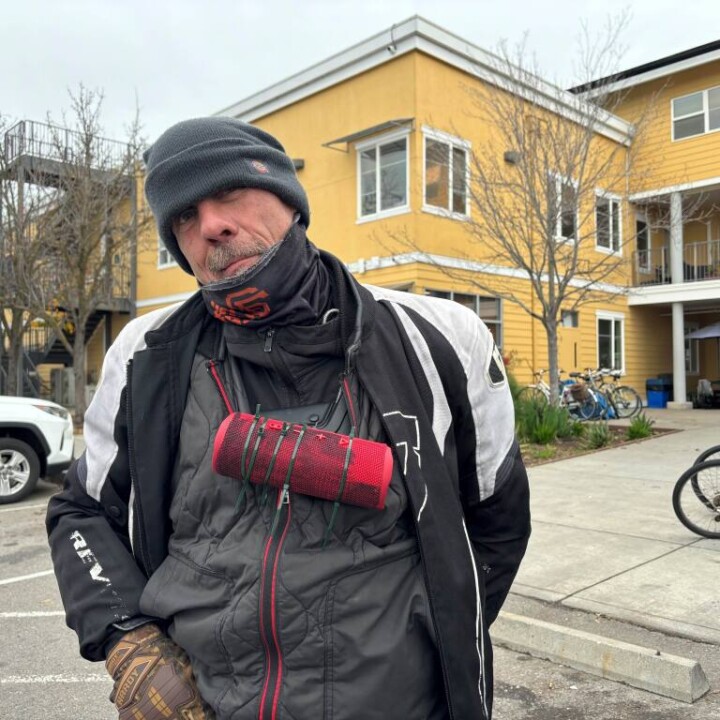
Dozens gathered before dawn Friday for a tally that influences how much in government funds the city and county will receive to alleviate homelessness.
Petaluma Argus-Courier
Cynthia's Story
With a grandfather who was a local policeman for 20 years, a first communion ceremony at St. Joseph’s, and even taking her first breath in the Hillcrest Hospital, Cynthia’s connection to Petaluma runs deep.
While her early years were spent in Sebastapol, Cynthia could not be kept from returning to Petaluma as a young adult. Unfortunately, Cynthia soon fell into the clutches of addictive substances and the relationship with her parents and 3 siblings deteriorated. With her parents now living in Oregon, Cynthia found herself alone and in the deep pocket of addiction. For 37 years, Cynthia’s life was shaped by this dependency on Methamphetamine. During this time, Cynthia also faced the hardships of being homeless for approximately 10 years.
When Cynthia was ready to get off the streets, she faced the harsh realities of long waiting lists and restrictive qualifications needed to enter a shelter. Thankfully, Cynthia found a spot at the Mary Isaak Center to start over and people who would support her journey. One person she recalls is the current COTS Program Director, Robin, chuckling as she stated, “Oh I love Robin now. Sorry, Robin. But she was very hard on me at first.” This “Tough Love” allowed Cynthia to start working with her Care Team as she moved from the Mary Isaak Center to People’s Village, and finally out to permanent housing at Studios at Montero (SAM).
People’s Village provided Cynthia with personal space, privacy, and new friends like Stacie, COTS People’s Village Services Manager. Cynthia liked living in People’s Village but knew she could not stay there forever. With the help of her Care Team, Cynthia secured a housing voucher and was able to move into SAM’s affordable housing, where she still lives today.
Cynthia has recently been diagnosed with congestive heart failure but is able to access medical help through the support services offered through SAM and is excitedly looking forward to living out the rest of her years in her beloved town of Petaluma.
The COTS Collective: January 2024

January COTS’ Collective.
COTS is happy to celebrate the new year with all our clients, staff, and community.
In 2024, COTS will continue to employ a multifaceted approach to addressing the unique challenges faced by individuals experiencing homelessness.
In 2023, COTS proudly worked alongside more than a thousand individuals. Our experienced and compassionate care managers worked closely with our clients to provide access to essential resources, and to ensure each individual receives detailed support—addressing both immediate concerns and long-term goals and desires.
In 2024, COTS will continue to nurture its community partnerships, and we will focus on expanding these partnerships within the larger county. We are looking forward to program expansions and furthering our mission as we grow into the Santa Rosa area. We will continue to actively advocate for increased affordable housing options. In partnership with cities, counties, and other providers, COTS will continue working to establish a network of safe and affordable homes for individuals and families who need them most.
We welcome you to join us in celebrating the new year! With your help, COTS can continue providing high-quality, innovative housing solutions in our mission to end homelessness. COTS welcomes you to partner with us in this critical mission—if you would like to volunteer, donate, tour our facilities, or support our organization in another way, please reach out to Erin Krueger at ekrueger@cots.org.
In 2024, let our community exemplify a commitment to ending homelessness and creating a more inclusive society where everyone has a place to call home.

Sincerely,

Chris Cabral, CEO
At COTS, we offer a variety of affordable housing options, including Integrity Housing, Permanent Supportive Housing, and Rapid Re-Housing, and Studios at Montero.
While these programs are vital to helping our community find and keep housing, we still need more! We hope you’ll consider a donation through a will or trust – demonstrating an enduring investment in COTS’ mission, ensuring that we will be there to help our neighbors in need for generations to come.
Members of our Legacy Society should have received an invitation to our annual Legacy Luncheon on February 13th. If you have made COTS part of your will or trust and did not receive an invitation, please email Erin Krueger at ekrueger@cots.org.
At COTS, we offer a variety of affordable housing options, including Integrity Housing, Permanent Supportive Housing, and Rapid Re-Housing, and Studios at Montero.
While these programs are vital to helping our community find and keep housing, we still need more! We hope you’ll consider a donation through a will or trust – demonstrating an enduring investment in COTS’ mission, ensuring that we will be there to help our neighbors in need for generations to come.
Members of our Legacy Society should have received an invitation to our annual Legacy Luncheon on February 13th. If you have made COTS part of your will or trust and did not receive an invitation, please email Erin Krueger at ekrueger@cots.org.
The COTS Collective: December 2023

A Year of Change: Reflecting on Our Impact in the Fight Against Homelessness.
Dear COTS Supporters,
We are approaching the end of a remarkable year, and we are filled with gratitude and a deep sense of accomplishment for all we have achieved. My first year here as CEO has been filled with incredible stories and organizational growth—I continue to be humbled by the shared commitment of our staff and community supporters.
As we enter this holiday season, we are reminded why this work is so important. Holidays are a time when people come together to celebrate joy, warmth, and connection. For those experiencing homelessness, this time of year can be especially challenging, underscoring the importance of ensuring that every individual, regardless of their circumstances, is treated with dignity and compassion.
Looking ahead to 2024, COTS remains steadfast in our commitment to ending homelessness. We have several clients planning to move into permanent housing in January, which would not be possible without your gifts. Your continued support will be instrumental in expanding our reach, enhancing our programs, and driving even greater positive change in the lives of those we serve.
We express our deepest gratitude for your belief in our mission and your dedication to making a difference. COTS wishes you and your loved ones a safe and happy holiday season.
Until next time,

Sincerely,

Chris Cabral, CEO
“I rejoice every time some of our clients get housed”
– Nichole, COTS Care Manager
“This shelter helped me. This shelter showed me how to live.”
– James, A former COTS Client, now permanently housed
“This was a really hard time in our lives, and it helped us out immensely, I couldn’t honestly be more grateful.”
– Brandy, A former COTS Client, now permanently housed with her husband and little girl
Your support will ensure that those experiencing homelessness in our community will have access to shelter, nutritious meals, physical and mental healthcare, and more. To learn about how COTS impacts those in our community read our Care Manager Nichole’s story of how she went from living on the street to helping others in need.

Above: COTS Care Manager Nichole talks during the Fall 2023 Investor’s Update about her experiences as a COTS client and Care Manager.

